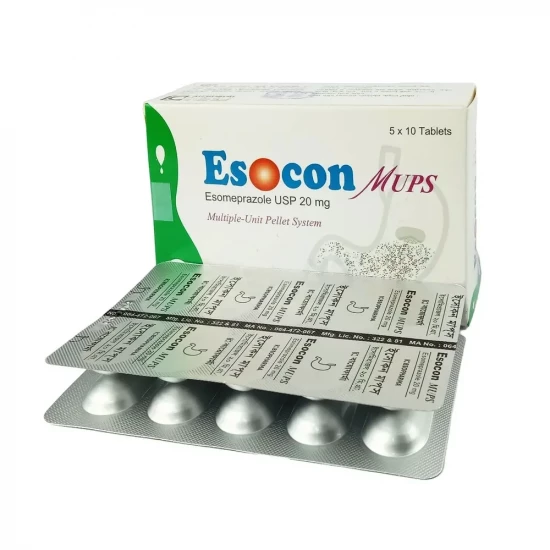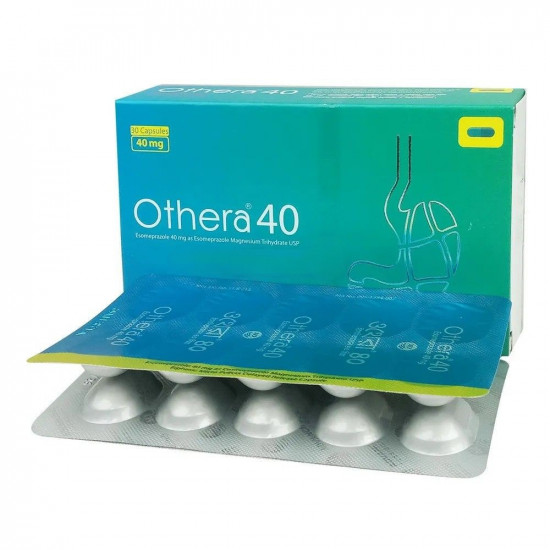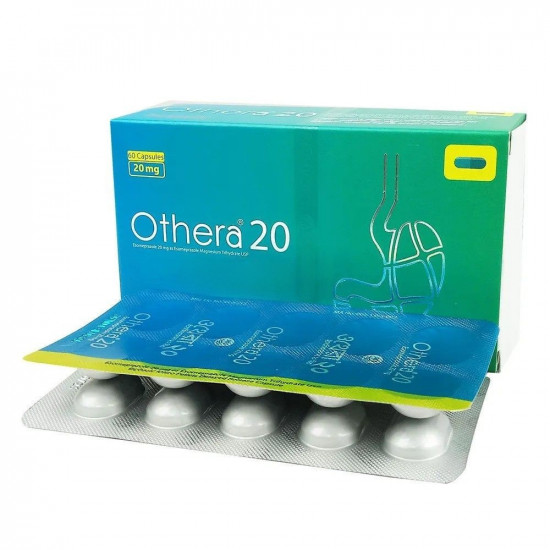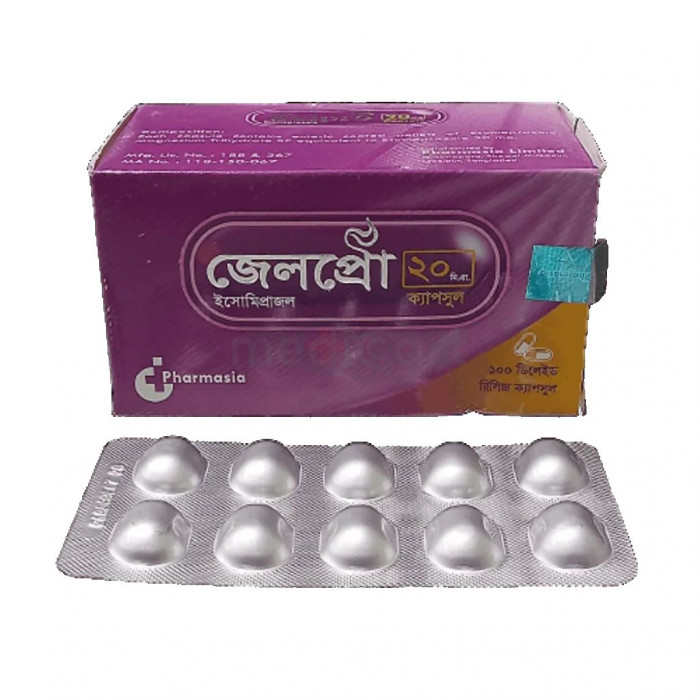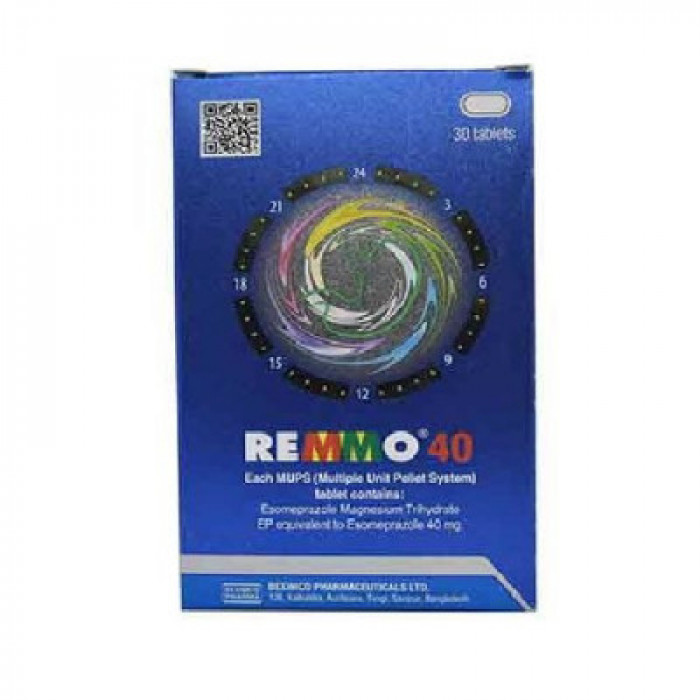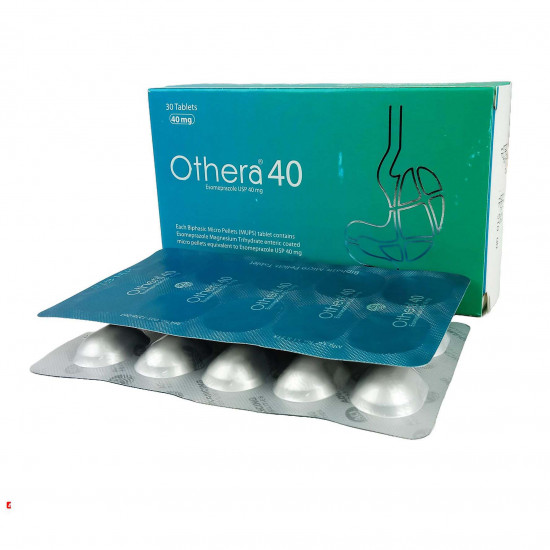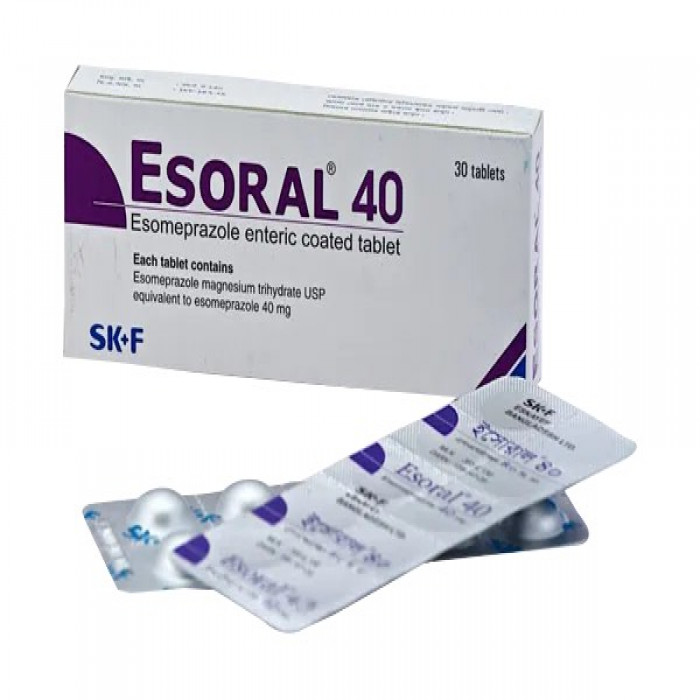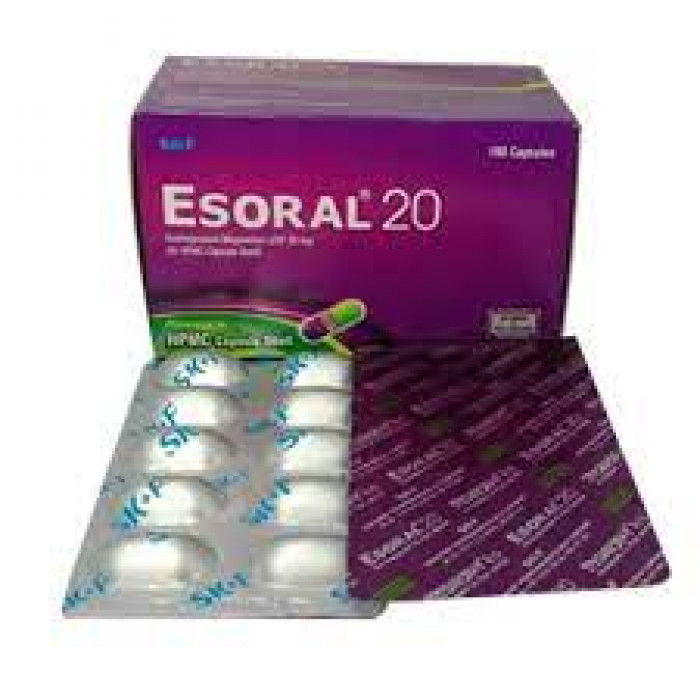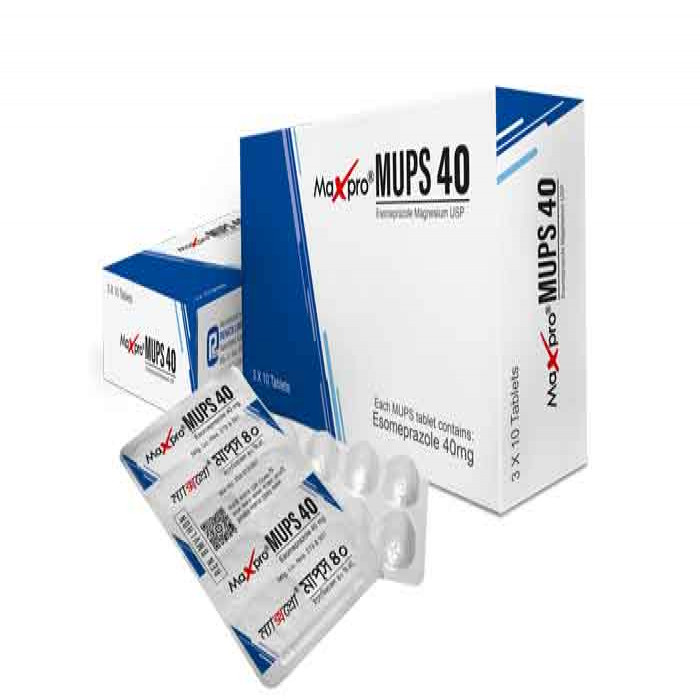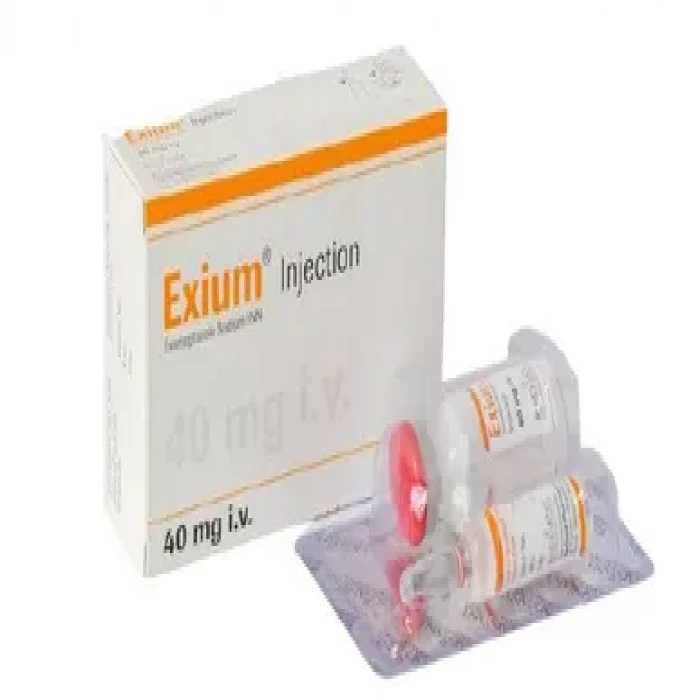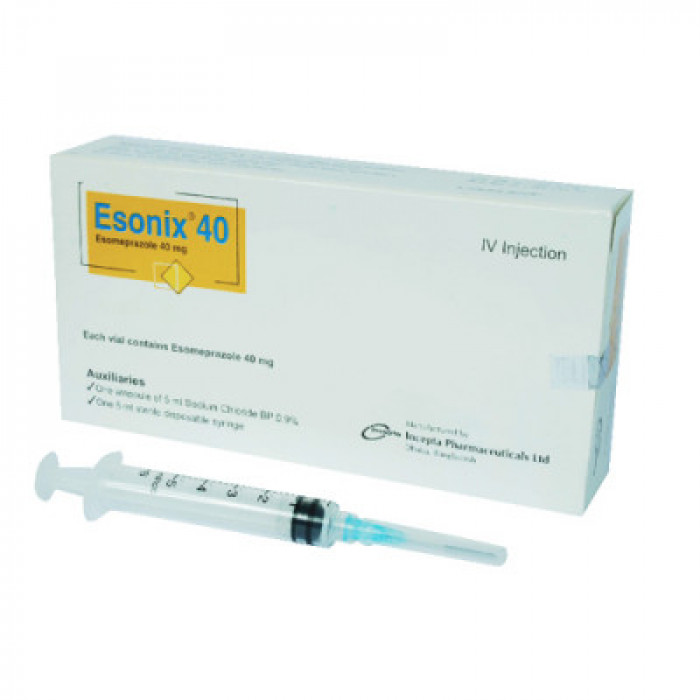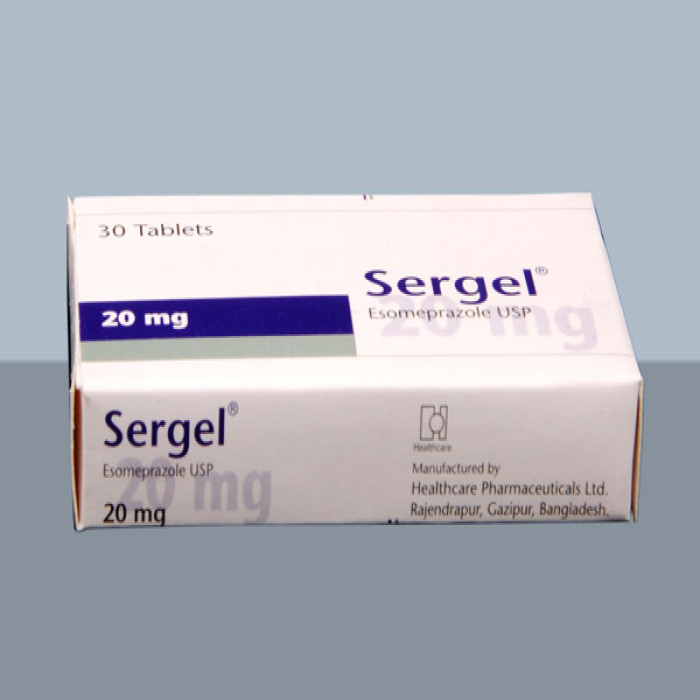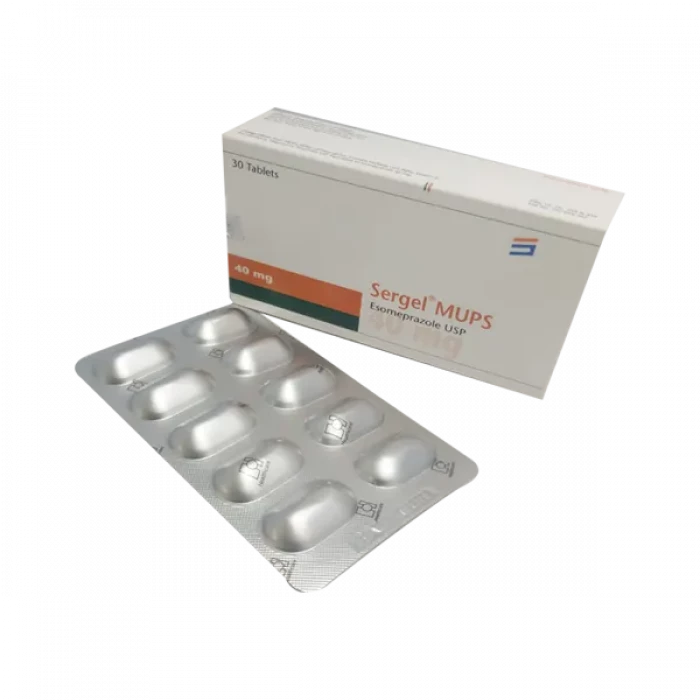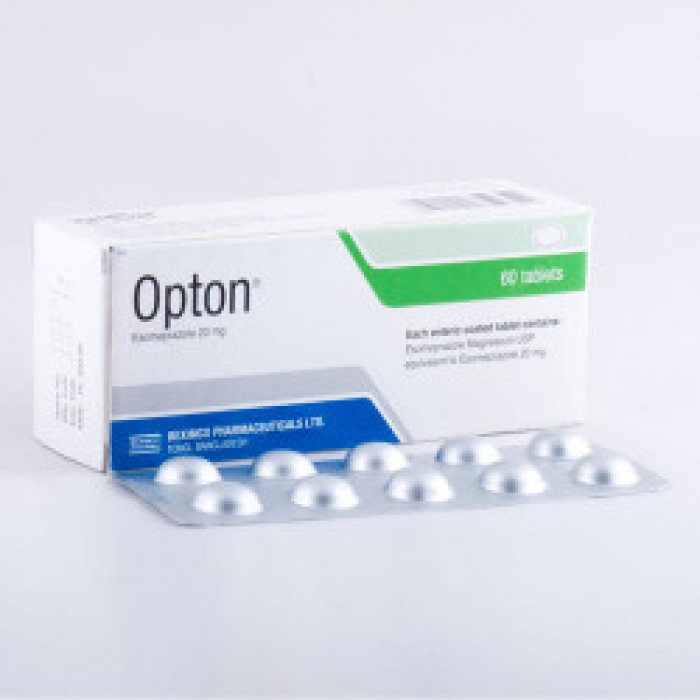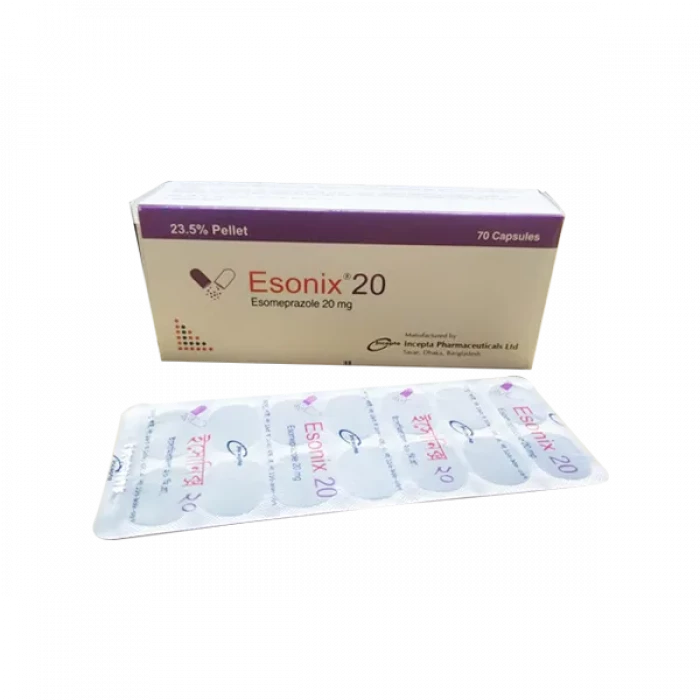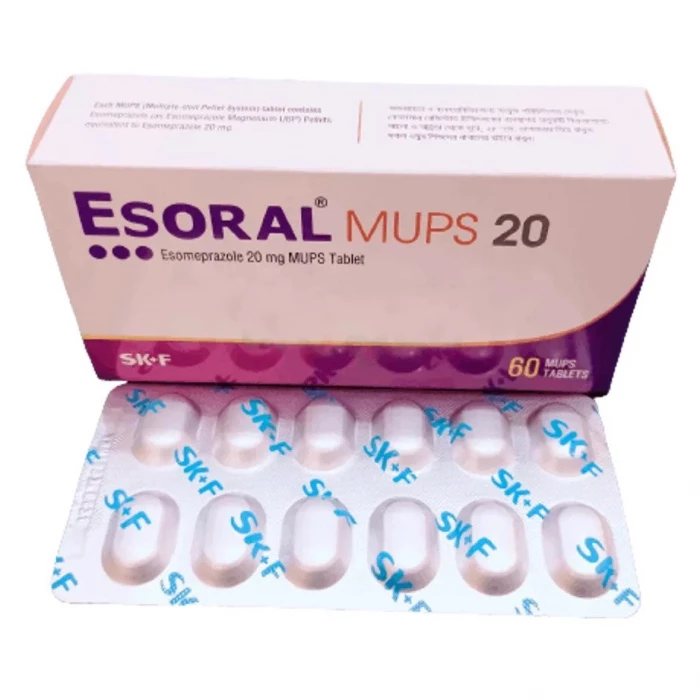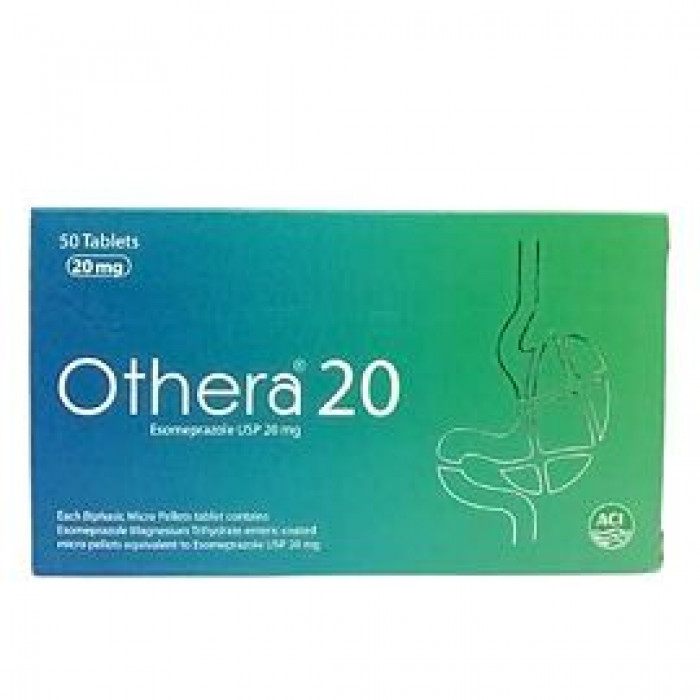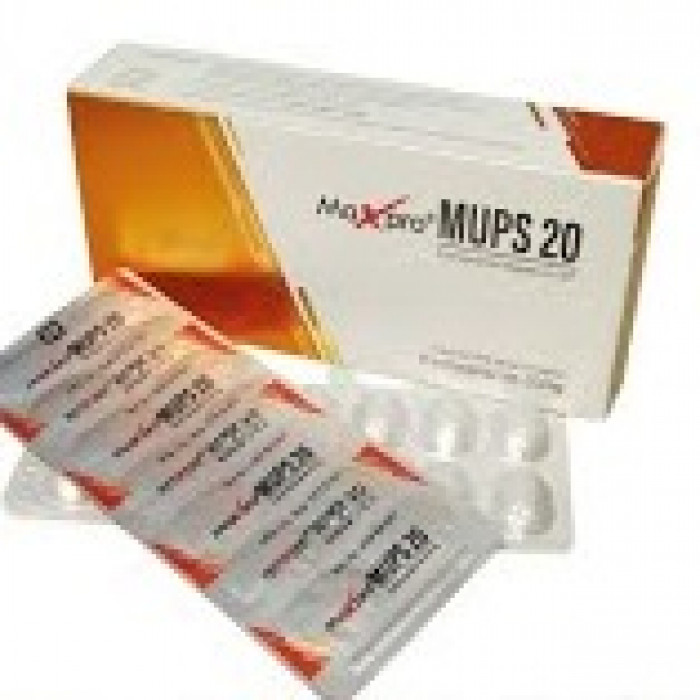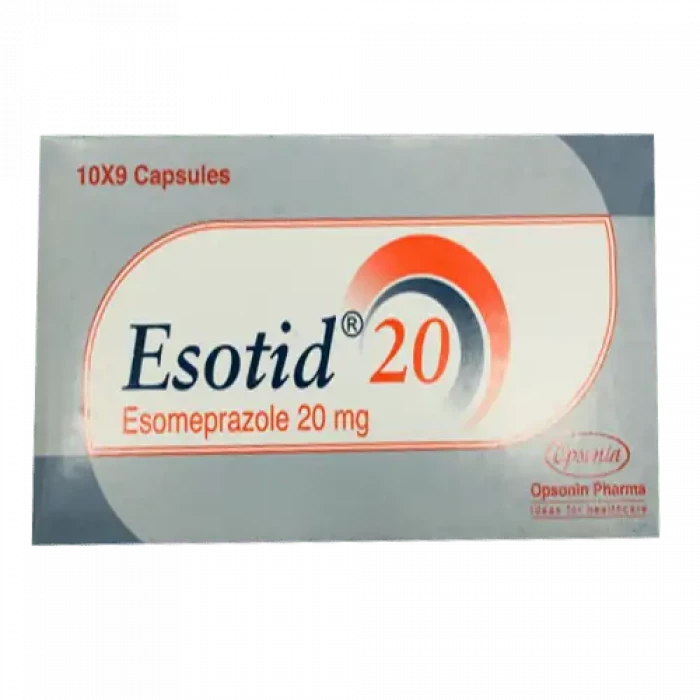
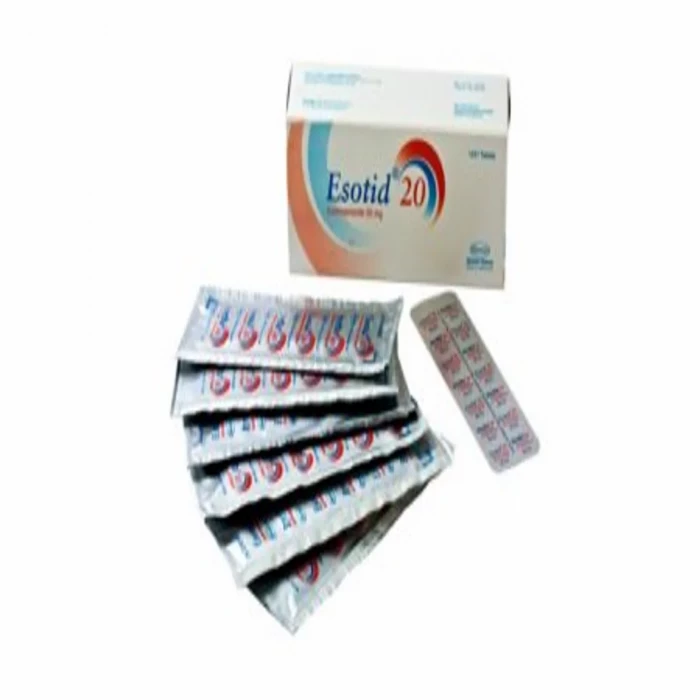
✔ 100% Authentic Product
👁️ Currently Viewing 6750
Esotid 20mg Capsule 10Pcs
- Esotid 20 Capsule includes Esomeprazole, a medication from the class of drugs known as proton pump inhibitors. It is used to treat heartburn caused by gastroesophageal reflux disease (GERD) in adults and adolescents older than 12 years old.
- In addition to treating stomach ulcers and NSAID-related conditions in adults and adolescents over the age of 12, Esotid 20 also aids in the treatment of Helicobacter pylori-related upper digestive tract (intestine) infections. Additionally, Zollinger-Ellison syndrome is managed using it. (too much acid produced in the stomach caused by a growth in the pancreas).
- GERD is a condition where stomach acid leaks into the esophagus, the tube that connects your neck to your stomach, causing pain and irritation.
- It is not advised for people with severe renal and liver failure to take Esotid 20mg Capsule. Only when your doctor determines that using Esotid 20mg Capsule while pregnant women are definitely required, should you take it. It is not advised for use by nursing mothers. Before using the medication, seek guidance from your physician.
- It is not advisable for children and adolescents under the age of 12 to use Esotid 20mg Capsules. Before using the medication, seek guidance from your physician.
Discount
Price: ৳ 67
MRP:
৳
70
5%
Off

100% Genuine Products, Guaranteed

Safe & Secure Payments, Always

Fast, Secure & Efficient Delivery

Proper Packaging
 Cash on Delivery - All over Bangladesh
Cash on Delivery - All over Bangladesh Regular Delivery - 12-24 Hours, Dhaka City* Charge Tk.39-59
Regular Delivery - 12-24 Hours, Dhaka City* Charge Tk.39-59 Regular Delivery - 24-48 Hours, Other Cities* Charge Tk.99-110
Regular Delivery - 24-48 Hours, Other Cities* Charge Tk.99-110
 ফ্রি ডেলিভারিঃ - ৯৯৯ টাকা+ অর্ডারে, ঢাকা
শহরে
ফ্রি ডেলিভারিঃ - ৯৯৯ টাকা+ অর্ডারে, ঢাকা
শহরে ফ্রি ডেলিভারিঃ - ২৯৯৯ টাকা+ অর্ডারে, ঢাকার
বাহিরে
ফ্রি ডেলিভারিঃ - ২৯৯৯ টাকা+ অর্ডারে, ঢাকার
বাহিরে
100% Genuine Products, Guaranteed
Safe & Secure Payments, Always
Fast, Secure & Efficient Delivery
Proper Packaging
 Cash on Delivery - All over Bangladesh
Cash on Delivery - All over Bangladesh Regular Delivery - 12-24 Hours, Dhaka City* Charge Tk.39-59
Regular Delivery - 12-24 Hours, Dhaka City* Charge Tk.39-59 Regular Delivery - 24-48 Hours, Other Cities* Charge Tk.99-110
Regular Delivery - 24-48 Hours, Other Cities* Charge Tk.99-110 ফ্রি ডেলিভারিঃ - ৯৯৯ টাকা+ অর্ডারে, ঢাকা
শহরে
ফ্রি ডেলিভারিঃ - ৯৯৯ টাকা+ অর্ডারে, ঢাকা
শহরে ফ্রি ডেলিভারিঃ - ২৯৯৯ টাকা+ অর্ডারে, ঢাকার
বাহিরে
ফ্রি ডেলিভারিঃ - ২৯৯৯ টাকা+ অর্ডারে, ঢাকার
বাহিরে
✅ Description:
Esotid 20 Capsule is a medication that lowers the amount of acid produced in your stomach. It is used to treat heartburn, acid reflux, and food pipe issues. It is also employed in the prevention and treatment of stomach ulcers. You should take Esotid 20 Capsule as directed by your doctor.
Safety Advices

Alcohol
CAUTION
Caution is advised when consuming alcohol with Esotid 20 capsules. Please consult your doctor.

Pregnancy
CONSULT YOUR DOCTOR
Esotid 20 capsules may be unsafe to use during pregnancy. Although there are limited studies on humans, animal studies have shown harmful effects on the developing baby. Your doctor will weigh the benefits and any potential risks before prescribing them to you. Please consult your doctor.

Breastfeeding
CONSULT YOUR DOCTOR
Esotid 20 Capsule is probably unsafe to use during breastfeeding. Limited human data suggests that the drug may pass into the breastmilk and harm the baby.

Driving
CONSULT YOUR DOCTOR
It is not known whether Esotid 20 Capsule alters the ability to drive. Do not drive if you experience any symptoms that affect your ability to concentrate and react.

Kidney
CONSULT YOUR DOCTOR
Esotid 20 Capsule is safe to use in patients with kidney disease. No dose adjustment of the Esotid 20 Capsule is recommended. However, inform your doctor if you have any kidney disease.

Liver
CAUTION
Esotid 20 Capsule should be used with caution in patients with severe liver disease. A dose adjustment of Esotid 20 Capsule may be needed. Please consult your doctor.
✔️ Uses of Esotid 20 Capsule
- Gastroesophageal reflux disease (Acid reflux)
- Peptic ulcer disease
✔️ How to use Esotid 20 Capsule
Take this medicine in the dose and duration as advised by your doctor. Swallow it as a whole. Do not chew, crush or break it. Esotid 20 Capsule is to be taken empty stomach.
✔️ How Esotid 20 Capsule works
Esotid 20 Capsule is a proton pump inhibitor (PPI). It works by reducing the amount of acid in the stomach which helps in relief of acid-related indigestion and heartburn.
✔️ What if you forget to take Esotid 20 Capsule?
If you miss a dose of Esotid 20 Capsule, take it as soon as possible. However, if it is almost time for your next dose, skip the missed dose and go back to your regular schedule. Do not double the dose.
✔️ Side effects of Esotid 20 Capsule
- Headache
- Dizziness
- Dryness in mouth
- Nausea
- Abdominal pain
- Constipation
- Flatulence
- Diarrhea
✔️ Quick Suggestions:
- It is a well-tolerated medicine and provides relief for a long time.
- Avoid eating late at night or before bedtime.
- Inform your doctor if you get watery diarrhea, fever, or stomach pain that does not go away.
- Long-term use of Esotid 20 Capsule can cause weak bones and a deficiency of minerals such as magnesium. Take adequate dietary intake of calcium and magnesium or supplements as prescribed by your doctor.
- Consult your doctor right away if you develop decreased urination, edema (swelling due to fluid retention), lower back pain, nausea, fatigue, and rash or fever. These could be signs of a kidney problem.
✔️ Indications of Esotid 20 Capsule
Esomeprazole is indicated:
- Treatment of Gastroesophageal Reflux Disease (GERD)
- Healing of erosive esophagitis
- Maintenance of healing of erosive esophagitis
- Symptomatic Gastroesophageal Reflux Disease (GERD)
- Reduction of NSAID-associated gastric ulcer
- Pylori eradication (Triple therapy)
- Zollinger-Ellison syndrome
✔️ Pharmacology
Esomeprazole is a proton pump inhibitor that reduces stomach acid production by specifically inhibiting the H+/K+-ATPase in the gastric parietal cell. Esomeprazole (S-isomer of omeprazole) is the first proton pump inhibitor with a single optical isomer that outperforms racemic proton pump inhibitors in acid control.
For absorption, esomeprazole capsules contain an enteric-coated pellet formulation of esomeprazole magnesium. Peak plasma levels (Cmax) occur approximately 1.5 hours after oral administration (Tmax). When the dose is increased, the Cmax rises proportionally, and the area under the plasma concentration-time curve (AUC) rises three times from 20 to 40 mg. With repeated once-daily administration, systemic bioavailability is around 90%, compared to 64% with a single dose. In comparison to fasting conditions, the AUC after a single dose of esomeprazole is reduced by 33-53 percent after food ingestion. Esomeprazole should be taken at least one hour before meals. In 97 percent of cases, esomeprazole is linked to plasma proteins. Plasma protein binding is constant over a concentration range of 2 20 mmol/L. At a steady state, the apparent volume of distribution in healthy individuals is around 16 L. In the liver, the cytochrome P450 (CYP) enzyme system extensively metabolizes esomeprazole. Metabolites of esomeprazole have no anti-secretory activity. The majority of esomeprazole metabolism is carried out by the CYP2C19 isoenzyme, which generates the hydroxy and desmethyl metabolites. The rest is reliant on CYP3A4, which generates the sulphone metabolite. The plasma elimination half-life of esomeprazole is approximately 1-1.5 hours. Less than 1% of the parent medication is eliminated in the urine. Approximately 80% of an oral dose of esomeprazole is eliminated as inactive metabolites in the urine, with the remainder detected as inactive metabolites in the feces.
✔️ Dosage of Esotid 20 Capsule
- Healing of Erosive Esophagitis: 20 mg or 40 mg Once Daily for 4-8 Weeks.
- The majority of patients are healed within 4 to 8 weeks. For patients who don't heal after 4-8 weeks, an additional 4-8 weeks of treatment may be considered. Maintenance of Healing of Erosive
- Esophagitis: 20 mg Once Daily (Clinical studies did not extend 6 months).
- GERD Symptoms: 20 mg once daily for 4 weeks. If symptoms do not completely resolve after four weeks, an additional four weeks of treatment may be considered.
- Helicobacter Pylori eradication: Esomeprazole 40 mg once daily for 10 days, Amoxicillin 1000 mg twice daily for 10 days, Clarithromycin 500 mg twice daily for 10 days to reduce the risk of recurrence of Duodenal Ulcer.
- The dose for Zollinger-Ellison Syndrome is 20-80 mg once daily. Individual dosage adjustments should be made, and treatment should be continued for as long as clinically indicated.
- Acid-related dyspepsia: 20-40 mg once daily for 2-4 weeks, as needed.
✔️ Administration of Esotid 20 Capsule
- Esomeprazole tablet or capsule should be swallowed whole and taken one hour before a meal.
- Esotid 20 Capsule is to be taken empty stomach.
✔️ Interaction
Digoxin-induced cardiotoxicity is more likely. Diuretics increase the risk of hypomagnesemia. Warfarin may cause an increase in INR and prothrombin time. Tacrolimus, saquinavir, and methotrexate serum concentrations may be increased. Drugs metabolized by CYP2C19 may be eliminated more slowly (e.g. diazepam). Ketoconazole, erlotinib, and Fe salts' bioavailability may be reduced. Possibly fatal: Rilpivirine, atazanavir, and nelfinavir serum concentrations and pharmacological effects may be reduced. Clopidogrel's antiplatelet effects may be reduced.
✔️ Contraindications
Esomeprazole is not recommended for patients who have a history of hypersensitivity to any component of the formulation or substituted Benzimidazoles.
✔️ Pregnancy & Lactation
In pregnant women, there are no appropriate and well-controlled trials. Teratogenic effects have not been discovered in animal investigations. Esomeprazole excretion in milk has not been examined. If the use of esomeprazole is deemed necessary, breastfeeding should be stopped.
✔️ Precautions & Warnings
- In general, symptomatic response to esomeprazole treatment does not rule out stomach cancer.
- According to the manufacturer's instructions, esomeprazole pills should be taken at least one hour before meals.
- If a patient has difficulty swallowing capsules, place one spoonful of applesauce in an empty bowl, open the Esomeprazole capsules, and carefully pour the pellets within the capsule into the applesauce.
- The pellets should be mixed with the applesauce and consumed quickly.
- The applesauce should be cold and mushy enough that it can be eaten without chewing.
- It is not advised to consume or crush the pellets.
- The pellet/applesauce mixture should not be refrigerated for future use. Antacids may be used while taking esomeprazole.
✔️ Storage Conditions
Store in a dry location at a temperature not exceeding 30°C. Keep out of direct sunlight and dampness. Keep out of children's reach.
⚠️Disclaimer:
At ePharma, we’re committed to providing accurate and accessible health information. However, all content is intended for informational purposes only and should not replace medical advice from a qualified physician. Please consult your healthcare provider for personalized guidance. We aim to support, not substitute, the doctor-patient relationship.




